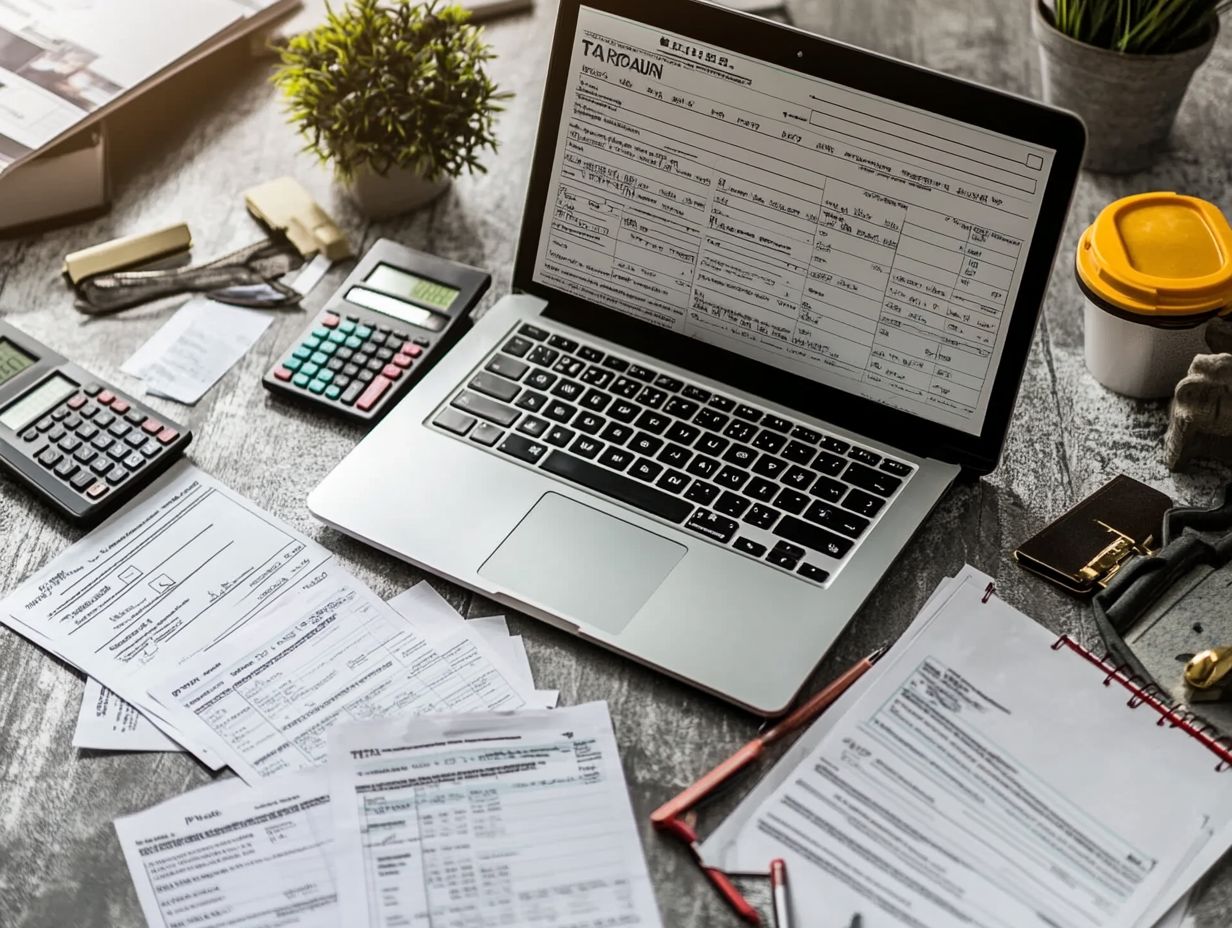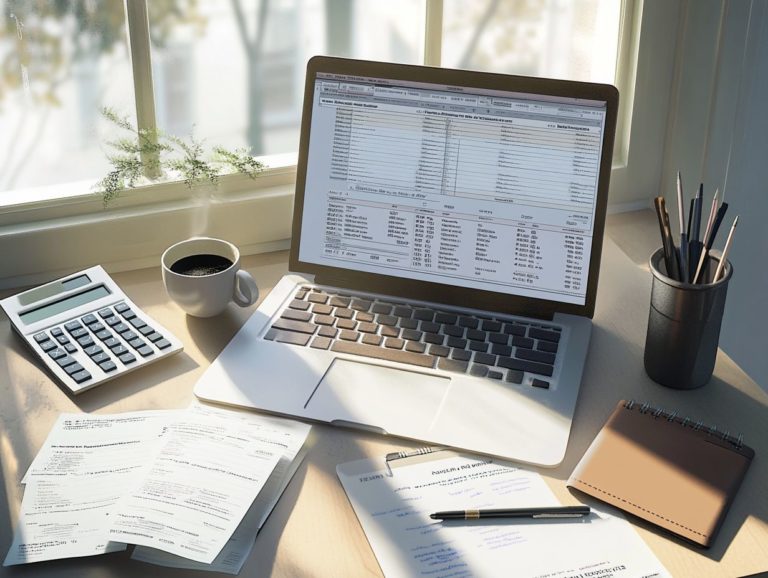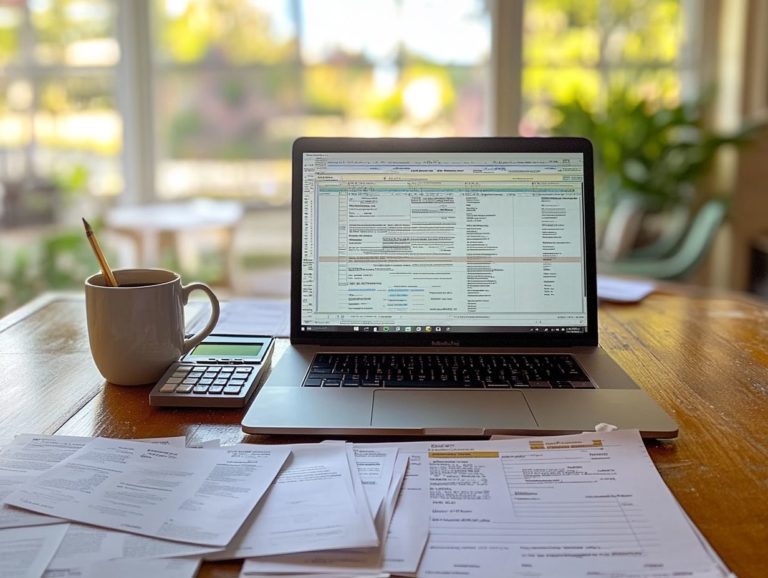Freelancer Tax Filing Checklist for 2024
Tax season can feel particularly overwhelming for freelancers, who often manage various income streams and unique deductions.
As the 2024 deadline looms, it s essential to navigate the complexities of filing your taxes with accuracy and efficiency. This checklist will serve as your roadmap guiding you through each step, from gathering essential documents to understanding your filing status and uncovering potential deductions.
By staying organized and informed, you can significantly reduce stress while maximizing your potential refund. Get organized now to save time later and tackle tax season with confidence!
Contents
- Key Takeaways:
- 1. Gather All Necessary Documents
- 2. Determine Your Filing Status
- 3. Calculate Your Income and Expenses
- 4. Understand Tax Deductions and Credits
- 5. Consider Quarterly Estimated Tax Payments
- 6. Know the Deadline for Filing
- 7. Choose the Right Tax Software or Professional
- 8. Don’t Forget About State Taxes
- 9. Be Aware of Tax Changes and Updates
- 10. Keep Track of Your Business Expenses Throughout the Year
- 11. Understand the Difference Between Employee and Self-Employment Taxes
- 12. Consider Hiring a Professional Tax Preparer
- 13. Don’t Ignore IRS Notices or Audits
- 14. Save for Taxes Throughout the Year
- 15. Review and Double-Check Your Tax Return Before Filing
- What Are the Consequences of Not Filing Taxes as a Freelancer?
- Frequently Asked Questions
- What is the Freelancer Tax Filing Checklist for 2024?
- Do I need to file taxes as a freelancer?
- What documents do I need to prepare for tax filing as a freelancer?
- Can I deduct any expenses as a freelancer?
- When is the deadline to file taxes for freelancers in 2024?
- What are the consequences of not filing taxes as a freelancer?
Key Takeaways:

- Gather all necessary documents to accurately report income and expenses.
- Understand the difference between employee and self-employment taxes to avoid potential penalties.
- Keep track of business expenses. Consider hiring a professional tax preparer to maximize deductions and minimize tax liability.
1. Gather All Necessary Documents
Gathering all the necessary documents is a crucial first step in the tax preparation process as a self-employed individual. Create a comprehensive tax checklist to ensure you include vital personal information, business expenses, and all relevant IRS forms needed for accurate filing during the 2024 tax year.
Essential documents include forms like the 1099-K, which reports payment card and third-party network transactions, and W-2 forms for any traditional employment income you may have.
Don t overlook Schedule C; it s vital for detailing profit or loss from your business. Keep accurate records of your business expenses to optimize your deductions.
Staying organized is key. Utilize digital records through tax software like QuickBooks or Adobe Acrobat to easily categorize and securely store your documents. This approach streamlines the process and significantly reduces stress during tax season.
Having everything in one place fosters efficiency and ensures that nothing slips through the cracks when it s time to file.
2. Determine Your Filing Status
Determining your filing status is crucial as a self-employed individual, as it directly influences how you prepare your tax returns and the tax brackets that apply to your income. This choice can ultimately affect your overall tax liability.
Understanding the available filing statuses such as sole proprietor, married filing jointly, or head of household enables you to maximize your potential deductions and credits. Each status has unique criteria that can significantly impact your tax outcomes. For instance, qualifying as head of household may grant you access to higher standard deductions, while married individuals could enjoy lower tax rates when filing jointly.
By assessing your eligibility for different statuses, you can strategically reduce your taxable income and leverage credits tailored to your specific situation, leading to a more favorable tax outcome.
3. Calculate Your Income and Expenses
Calculating your income and expenses with precision is essential for self-employed individuals. This forms the cornerstone for grasping your financial standing and maximizing tax deductions, including business expenses and rental income.
An organized system for tracking these elements is equally crucial; it profoundly influences your understanding of your financial health. Establish specific categories to track deductions related to home office use, travel expenses incurred during business trips, and meals directly tied to work activities.
Efficient documentation simplifies your life during tax season and serves as a vital safeguard in the event of IRS audits. Use tools like expense tracking apps, maintain meticulous receipts, and categorize your expenditures from the start. This will pave the way for better financial strategies and a greater sense of peace of mind.
4. Understand Tax Deductions and Credits
Understanding tax deductions and credits is essential for self-employed individuals. These can significantly reduce your tax liability the total amount of tax you owe and help you make informed decisions about your estimated tax payments based on your unique business structure.
It’s easy to overlook various deductions that could greatly impact your financial situation. For instance, you can deduct insurance premiums for health and long-term care, which can provide substantial relief. Legal fees incurred during business operations are also often deductible, giving a favorable advantage for those navigating contracts or disputes.
Other opportunities for tax savings include home office deductions and expenses related to business travel.
Understanding the difference between tax credits and deductions is key to maximizing your savings. While deductions lower your taxable income, tax credits directly reduce the total tax you owe, making them more influential on your overall finances. Recognizing these distinctions enables you to plan more effectively and ultimately lessen your tax burden.
5. Consider Quarterly Estimated Tax Payments
Considering quarterly estimated tax payments is crucial for self-employed individuals. This practice helps you avoid penalties and manage your tax liability effectively throughout the year, setting the stage for a seamless tax season.
By mastering the calculation of these payments, you can anticipate your tax obligations more accurately and avoid a daunting bill when tax season arrives. Keeping an eye on quarterly deadlines is vital; missing them can result in unnecessary fines and interest. Additionally, exploring freelancer tax strategies for the self-employed can help you optimize your approach. Recording your income throughout the year and using that data to estimate your payments can make the process much smoother.
This proactive approach enhances your financial planning and allows you to make necessary budget adjustments, helping you dodge any surprises that could disrupt your financial stability come April.
6. Know the Deadline for Filing
Knowing the deadline for filing your tax returns is absolutely essential for self-employed individuals. Staying compliant with IRS regulations rules set by the Internal Revenue Service ensures you avoid those pesky late fees during the critical 2024 tax year.
Understanding the specific dates for various forms like Schedule C and Form 1040 can greatly enhance your financial planning efficiency. Generally, self-employed individuals face a filing deadline of April 15. However, you can file for an extension, pushing that deadline to October 15. Just remember: even with an extension, any taxes owed must be settled by the original deadline to avoid penalties. For more tailored advice, consider checking out freelancer tax tips for artists and creatives.
To keep everything organized, maintaining meticulous records throughout the year and setting reminders can help you manage the stress of last-minute filing. Using tax software or consulting a tax professional can streamline the preparation process, ensuring that all your expenses and deductions are properly accounted for. For freelancers, knowing how to file taxes as a freelance consultant is also crucial.
7. Choose the Right Tax Software or Professional

Choosing the right tax software or professional tax preparer is a crucial decision for you as a self-employed individual. It significantly impacts your tax preparation efficiency and compliance with IRS requirements.
As you navigate the complexities of self-employment, evaluating the available tools and services becomes essential. Tax software like QuickBooks provides a user-friendly interface and key features tailored specifically for freelancers and independent contractors, including expense tracking and invoicing capabilities. Alternatively, hiring a professional tax preparer can offer you personalized guidance and peace of mind, especially when distinguishing between deductible business expenses and personal liabilities. Additionally, exploring tax planning tips for new freelancers can help you optimize your finances.
When weighing these options, consider important factors such as overall costs, the software’s ease of use, and how well the features align with your unique needs as a self-employed individual.
8. Don’t Forget About State Taxes
Self-employed individuals must stay vigilant about state taxes. Compliance with state regulations is just as essential as meeting federal tax obligations when filing tax returns.
Understanding state-specific requirements is vital. These regulations can differ significantly from one state to another, with each state having its own deadlines, forms, and rules for income tax. Ignoring these can lead to unwelcome penalties.
What may be permissible under federal law might not align with state mandates. Staying informed about these nuances leads to smoother tax filing processes and helps you avoid costly mistakes. This allows you to focus on your business growth instead of worrying about taxes.
9. Be Aware of Tax Changes and Updates
Being aware of tax changes and updates is crucial for you as a self-employed individual. The IRS (Internal Revenue Service) rolls out new regulations that can significantly impact your preparation for the 2024 tax year.
Changes might introduce new deductions or modify existing ones, directly affecting your overall tax burden. Understanding these updates allows you to optimize your financial strategies and avoid potential pitfalls.
It s essential to stay informed because even minor changes in tax law can lead to substantial differences in what you owe. Utilize resources like the IRS website, reputable financial news outlets, and professional tax advice services to stay updated and navigate your financial obligations confidently.
10. Keep Track of Your Business Expenses Throughout the Year
Keeping track of your business expenses year-round is essential for you as a self-employed individual. This practice helps maximize your tax deductions and ensures efficient document management when preparing your tax documents.
Using digital records and accounting software simplifies this process. With these tools, you can categorize expenses, monitor cash flow, and generate insightful reports easily. Transitioning to electronic records enhances organization and reduces the risk of losing receipts or important documents.
Staying organized is key during IRS audits. Well-maintained records demonstrate compliance and support your claims for deductions.
These methods streamline your financial management and provide peace of mind when tax season arrives.
11. Understand the Difference Between Employee and Self-Employment Taxes
Understanding the difference between employee and self-employment taxes is crucial for you as a self-employed individual. This knowledge affects your filing status, payment amounts, and specific IRS forms like the W-2 and 1099-K.
Regular employees have taxes deducted directly from their paychecks, but you are responsible for calculating and remitting these taxes yourself. This can make the process more intricate. The self-employment tax, which includes both Social Security and Medicare taxes, totals about 15.3%, significantly higher than what an employee pays.
The financial ramifications can be considerable, influencing your overall tax liabilities and possibly leading to larger out-of-pocket expenses at tax time. Navigating these differences is essential for managing your finances effectively and ensuring compliance with IRS regulations.
12. Consider Hiring a Professional Tax Preparer
Hiring a professional tax preparer can be a game-changer for self-employed individuals like you. It streamlines the tax preparation process and ensures compliance with IRS (Internal Revenue Service) regulations.
With a qualified tax professional on your side, you can uncover valuable deductions and credits that might slip through the cracks if you file independently. This choice alleviates the stress that often accompanies tax season and allows you to devise a smart plan for your taxes, potentially saving you significant money in the long run.
It’s important to consider the costs involved, as hiring a professional does represent an additional expense. When evaluating potential tax preparers, keep in mind their qualifications, experience with self-employment tax issues, and client reviews. For those new to freelancing, exploring freelancer tax tips for first-time filers can also shape the overall effectiveness of your tax strategy.
13. Don’t Ignore IRS Notices or Audits
Ignoring IRS notices or audits can have serious consequences for self-employed individuals. Proactive communication and meticulous record-keeping during tax preparation are essential.
These notices often alert you to issues like discrepancies in reported income, missing forms, or proposed adjustments to your tax returns. Familiarizing yourself with common IRS notices, such as the CP2000 or Notice of Deficiency, helps you respond effectively and reduces stress.
To address these notices, consider the following strategies:
- Promptly review the contents
- Gather the necessary documentation
- Seek guidance from tax professionals if needed
Maintaining accurate tax records supports your filings and serves as crucial evidence during an audit. This reinforces your financial integrity and ensures compliance with tax obligations.
14. Save for Taxes Throughout the Year

Saving for taxes throughout the year is a smart financial strategy for self-employed individuals. It ensures you’re well-prepared for estimated tax payments and minimizes your overall tax liability.
By adopting effective budgeting methods, like the 50/30/20 rule, you can allocate funds wisely. Designate a specific percentage of your income for savings specifically for tax obligations. This disciplined approach helps you avoid last-minute financial stress and manage your cash flow better.
Utilizing resources like budgeting apps and tax calculators can elevate your efforts. These tools offer insights and tracking capabilities that help you make smarter financial decisions. Consulting with a tax professional can provide tailored advice, ensuring your savings strategies align with current tax laws and your personal financial goals.
15. Review and Double-Check Your Tax Return Before Filing
Take a moment to review your tax return catching errors now can save you headaches later! This careful examination helps ensure that all tax documents are accurately accounted for, keeping IRS issues at bay.
Engaging in this meticulous process can prevent unnecessary audits and penalties, giving you peace of mind. Create a detailed checklist that includes all relevant income items, deductions, and supporting documentation.
Stay vigilant about common errors, such as:
- Missed income sources
- Incorrect deduction claims
- Transposed numbers
By confirming that every detail aligns with your financial records, you affirm the integrity of your return. Thorough preparation not only guarantees compliance but also optimizes your tax outcomes, potentially leading to greater refunds or reduced liabilities.
What Are the Consequences of Not Filing Taxes as a Freelancer?
Not filing taxes as a freelancer can lead to serious repercussions, including big fines, higher taxes, and the possibility of drawing unwanted attention from the IRS (the Internal Revenue Service, which oversees tax collection). This underscores the necessity of timely and precise tax filing.
The penalties can be particularly intimidating. They often manifest as hefty fines that pile up over time, creating an increasing financial burden for you. As a freelancer, you also risk being flagged for audits, which can be not only stressful but also time-consuming and costly, especially if you need professional help.
Neglecting your tax obligations can have long-lasting consequences, like accruing interest on unpaid balances and potentially tarnishing your credit score. This can make securing loans tougher! Therefore, grasping these risks is vital for anyone navigating the complexities of freelance income. To avoid pitfalls, learn how to prepare for tax season as a freelancer.
Avoid These Tax Mistakes as a Freelancer!
Freelancers often fall into familiar traps when filing taxes, such as missing out on crucial deductions, neglecting accurate record-keeping, or miscalculating income items, which can lead to unwanted penalties.
To steer clear of these pitfalls, you must adopt a systematic approach to record-keeping now! Ensure all your financial documents are organized and readily accessible. Keeping a dedicated folder for receipts and invoices can truly make a difference when tax season rolls around.
You should also take the time to familiarize yourself with the specific tax forms relevant to your business activities. Understanding these forms enables you to make smarter financial decisions and maximize your deductions. To further enhance your preparation, explore 5 ways freelancers can prepare for tax season. Consider using tax software or consulting with a tax professional; it can streamline the process and make your filing experience more accurate and far less stressful.
How Can Freelancers Minimize Their Tax Liability?
You can minimize your tax liability as a freelancer by strategically leveraging tax deductions, accurately reporting business expenses, and making timely estimated tax payments throughout the year.
Understanding available deductions is key. For example, the home office deduction lets you write off a portion of your rent or mortgage, while meal deductions apply to business-related dining expenses, effectively reducing your taxable income. Additionally, expenses related to software, equipment, and even continuing education can lead to significant savings.
Staying organized with receipts and maintaining proper documentation is essential for justifying these deductions when tax season rolls around. Taking advantage of retirement account contributions is a powerful strategy to lower your taxes while also securing your financial future.
What Are the Tax Deductions and Credits Available for Freelancers?
As a freelancer, you have access to a wealth of tax deductions and credits that can significantly reduce your overall tax liability. These include deductions for self-employed business expenses, legal fees, and insurance premiums.
You can take advantage of deductions related to your home office, which is particularly relevant if you’re running your operations from home. Just remember that eligibility typically requires the space to be used exclusively for business activities, so keeping meticulous records is essential.
Other potential deductions you might explore include costs for continuing education, advertising, and certain travel expenses incurred while conducting business. To claim these deductions effectively, it’s vital to maintain accurate documentation and receipts throughout the year, ensuring that each expense aligns with IRS guidelines for a smooth tax filing experience.
How Can Freelancers Stay Organized for Tax Season?
As a freelancer, you can navigate tax season with ease by implementing effective document management strategies and leveraging digital records. Maintaining a systematic approach to tracking your income and expenses is key.
Use software tools like QuickBooks to streamline your bookkeeping processes. This transforms what can often feel like an overwhelming task into a far more manageable endeavor. Consistently categorizing your expenses ensures that receipts and invoices are sorted promptly, saving you from any last-minute stress.
Creating regular backups and utilizing cloud storage solutions not only protects your valuable information but also provides easy access from multiple devices. Setting aside time each week to review and update your records fosters discipline and helps you identify potential deductions and credits earlier. This ultimately saves you both time and money when tax season rolls around.
Frequently Asked Questions

What is the Freelancer Tax Filing Checklist for 2024?
The Freelancer Tax Filing Checklist for 2024 is a comprehensive list of all the necessary documents and information that freelancers need to file their taxes for the 2024 tax year.
Do I need to file taxes as a freelancer?
Yes, as a freelancer, you are working for yourself and are required to file taxes on your income. Even if you did not make a profit, you still need to file a tax return.
What documents do I need to prepare for tax filing as a freelancer?
- 1099-MISC forms from your clients, which show how much they paid you
- Invoices and receipts for all income and expenses
- Any relevant business licenses or permits
- Proof of health insurance if you are self-employed
Can I deduct any expenses as a freelancer?
Yes, as a freelancer, you can deduct business-related expenses such as:
- Home office expenses
- Equipment and supplies
- Travel expenses
- Marketing and advertising costs
Keep detailed records and receipts for all expenses.
When is the deadline to file taxes for freelancers in 2024?
Don’t miss the April 15, 2024, deadline to file your taxes! However, if you are unable to file by this date, you can request an extension until October 15, 2024, by filing Form 4868.
What are the consequences of not filing taxes as a freelancer?
If you fail to file your taxes as a freelancer, you may face penalties and interest charges from the IRS. Your tax liability may increase, and in extreme cases, failure to file taxes can result in criminal charges. It is essential to file your taxes on time to avoid these consequences.
Get started on your tax preparation now to stay ahead of the game!






